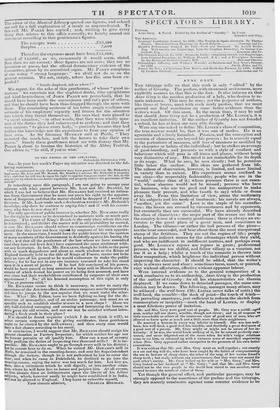TO THE EDITOR OF THE SPECTATOR.
2.3(1 October 1534.
Sin—In your last week's Paper my attention was directed to the fol- lowing statement.
We are authorized to say, that whatever may have passed between Mr. Rickards's legal agent, Mr. Law, and Mr. Brandt, Mr. Iliudley's adviser. Mr. Rickards is no party to it ; and that he still iusizt r upon his right to appoint Surgeons under the Act, as the only menus by which he can insure regularity and properly enforce the provisions of the statute."
In remarking upon this paragraph, I am not going to occupy your columns with what passed between Mr. LAW and Mr. BRANDT, by which I was led to believe that Mr. RICKARDS had received an intima- tion from Government that he must not press his right to the appoint- ment of Surgeons, and that the matter should be dropped if' I would pay the costs. If Mr. LAW made such a declaration WITHOUT Mr. Richards's knowledge, why does he continue to employ him? and if with his concur- rence, why does he now deny it? The only question of public interest is, whether Mr. RICKARDS really has the right he seems to be determined to maintain with so much per- tinacity. The Court of King's Bench is the only place where this can be determined ; and thither the matter will in all probability be carried, in case Mr. RICKARDS *hould refuse to countersign certificates on the ground that they have not been signed by surgeons of his own appoint- ment. In the mean time, I would have the public know that the opinion of many members of the Government is decidedly against his having the right ; aid that all the gentlemen of the law whom we have consulted (and they have not been few) have expressed the same sentiment with- out any hesitation. In fact, Mr. RICKARDS, though he holds to the point with as much doggedness and about as much wisdom as the Kings of England formerly held to the title of Kings of France, seems not to be quite as sure of his ground as he would endeavour to make the public believe ; for he has not in any one instance ventured to take his stand upon it in a court of justice. If be had felt convinced of his power, would he have passed so long unnoticed a large mill in Manchester, the owners of which denied his power on its being first assumed, and have ever since had their workchildren certificated by surgeons of their own appointment ? No ! all his boasted assumption of this right is only " Vox et preterea nihil." Mr. RICKARDS seems to think it necessary, in order to carry the operations of the Act into effect, that certain surgeons must be appointed ; and then he jumps to the non sequitur that tit: must make the selec- tion. What ! Mr. Editor, have we been fighting so long for the de- struction of monopolies, and of an undue patronage, and must we so speedily seek to establish similar abuses in a new shape ? Have we only half-finished sweeping and scouring and fumigating the house, to drive sway the old vermin, and can we not be satisfied without intro- ducing a fresh stock in their place ? If it should be found requisite (which I do not think it will), to select certain surgeons for the giving certificates, these gentlemen ought to be elected by the mill.owners ; and then every man would have a fair chance according to his merit. In conclusion, I would suggest that Mr. RICKARDS should resign his present situation as Factory Inspector; for which neither his age nor his former pursuits at all qualify him. How can a man of seventy really perform the duties of inspecting two thousand mills ? It is im- possible. Mr. RICKARDS ought to go through every mill in his district ; but he cannot bear to do so. When be visited Mr. HOWARD'S mill in llyde, he remained in the counting-house, and sent his Superintendant through the factory, though he is not authorized by law to enter the door; and when he came to Dukinfield, he declined to go into the weaving-rooms, saying the noise was too much for him. Let him go, then, into a retirement which he will dignify, or into another situa- tiOn,where he will have less to harass and perplex him. At all events, let him abstain from an infringement upon the liberty of his fellow subjects, which, however easily lie might have established it in India, will not be allowed in England. I beg leave to subscribe myself,


















 Previous page
Previous page